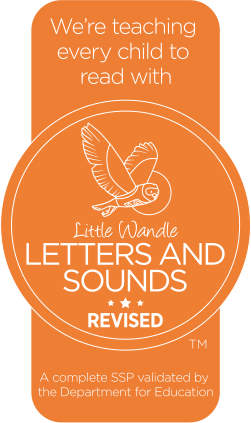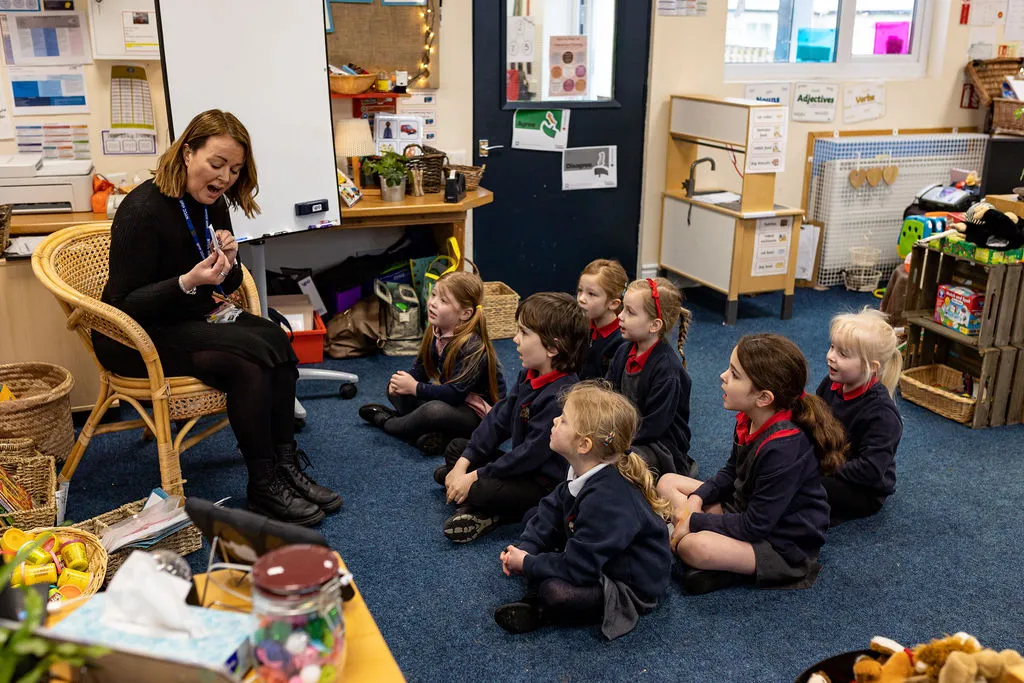At Hunton & Arrathorne Community Primary School we aspire for every child to have the skills to be a lifelong reader; we recognise and prioritise phonics and early reading as fundamental in achieving this goal. As a school, we follow Little Wandle Letters and Sounds Revised as our Statutory Synthetic Phonics Programme.
Intent
Phonics (Reading and Spelling)
At Hunton & Arrathorne, we believe that all our children can become fluent readers and writers. This is why we teach reading through Little Wandle Letters and Sounds Revised, which is a systematic and synthetic phonics programme. We start teaching phonics in Reception and follow the Little Wandle Letters and Sounds Revised progression, which ensures children build on their growing knowledge of the alphabetic code, mastering phonics to read and spell as they move through school.
As a result, all our children are able to tackle any unfamiliar words as they read. At Hunton & Arrathorne, we also model the application of the alphabetic code through phonics in shared reading and writing, both inside and outside of the phonics lesson and across the curriculum. We have a strong focus on language development for our children because we know that speaking and listening are crucial skills for reading and writing in all subjects.

Comprehension
At Hunton & Arrathorne, we value reading as a crucial life skill. By the time children leave us, they read confidently for meaning and regularly enjoy reading for pleasure. Our readers are equipped with the tools to tackle unfamiliar vocabulary. We encourage our children to see themselves as readers for both pleasure and purpose.
Because we believe teaching every child to read is so important, we have a Phonics & Early Reading Leader, in addition to our English lead, who drives the early reading programme in our school. This person is highly skilled at teaching phonics and reading, and they monitor and support our reading team, so everyone teaches with fidelity to the Little Wandle Letters and Sounds Revised programme.
Implementation
Daily phonics lessons in Reception and Year 1
- We teach phonics for 30 minutes a day. In Reception, we build from 10-minute lessons, with additional daily oral blending games, to the full-length lesson as quickly as possible. Each Friday, we review the week’s teaching to help children become fluent readers.
- Children make a strong start in Reception: teaching begins in Week 2 of the Autumn term.
- We follow the Little Wandle Letters and Sounds Revised expectations of progress:
- Children in Reception are taught to read and spell words using Phase 2 and 3 GPCs, and words with adjacent consonants (Phase 4) with fluency and accuracy.
- Children in Year 1 review Phase 3 and 4 and are taught to read and spell words using Phase 5 GPCs with fluency and accuracy.
Daily Keep-up lessons ensure every child learns to read
- Any child who needs additional practice has daily Keep-up support, taught by a fully trained adult. Keep-up lessons match the structure of class teaching, and use the same procedures, resources and mantras, but in smaller steps with more repetition, so that every child secures their learning.
- We timetable daily phonics lessons for any child in Year 2 or 3 who is not fully fluent at reading or has not passed the Phonics screening check. These children urgently need to catch up, so the gap between themselves and their peers does not widen. We use the Little Wandle Letters and Sounds Revised assessments to identify the gaps in their phonic knowledge and teach to these using the Keep-up resources – at pace.
- If any child in Year 3 to 6 has gaps in their phonic knowledge when reading or writing, we plan phonics ‘catch-up’ lessons to address specific reading/writing gaps. These short, sharp lessons last 10 minutes and take place at least three times a week.
Teaching reading: Reading practice sessions three times a week
- We teach children to read through reading practice sessions three times a week. These:
- are taught by a fully trained adult to small groups of approximately six children
- use books matched to the children’s secure phonic knowledge using the Little Wandle Letters and Sounds Revised assessments and book matching grids on pages 11–20 of ‘Application of phonics to reading’
- are monitored by the class teacher, who rotates and works with each group on a regular basis.
- Each reading practice session has a clear focus, so that the demands of the session do not overload the children’s working memory. The reading practice sessions have been designed to focus on three key reading skills:
- decoding
- prosody: teaching children to read with understanding and expression
- comprehension: teaching children to understand the text.
- In Reception these sessions start in Week 4. Children who are not yet decoding have daily additional blending practice in small groups, so that they quickly learn to blend and can begin to read books.
- In Year 2 and 3, we continue to teach reading in this way for any children who still need to practise reading with decodable books.
Home reading
- The decodable reading practice book is taken home to ensure success is shared with the family.
- Reading for pleasure books also go home for parents to share and read to children.
- We use the Little Wandle Letters and Sounds Revised parents’ resources to engage our families and share information about phonics, the benefits of sharing books, how children learn to blend and other aspects of our provision, both online and through workshops.
Additional reading support for vulnerable children
- Children in Reception and Year 1 who are receiving additional phonics Keep-up sessions read their reading practice book to an adult daily.
Ensuring consistency and pace of progress
- Every teacher in our school has been trained to teach reading, so we have the same expectations of progress. We all use the same language, routines and resources to teach children to read so that we lower children’s cognitive load.
- Weekly content grids map each element of new learning to each day, week and term for the duration of the programme.
- Lesson templates, Prompt cards and How to videos ensure teachers all have a consistent approach and structure for each lesson.
- The Reading Leader and SLT use the Audit and Prompt cards to regularly monitor and observe teaching; they use the summative data to identify children who need additional support and gaps in learning.
Ensuring reading for pleasure
‘Reading for pleasure is the single most important indicator of a child’s success.’ (OECD 2002)
‘The will influences the skill and vice versa.’ (OECD 2010)
Reading is at the heart of everything we do at Hunton & Arrathorne – so much so it is a key driver within our school vision, one of our curriculum aims is to be a lifelong reader. We have a variety of strategies to enable children to become lifelong readers.
- Reading sessions take place 3 times a week in EYFS and Year 1 in line with our SSP; Little Wandle.
- Whole class reading sessions 4 times per week from Year 2 – Year 6.
- Timetabled daily story times in each class, so children can listen to their teacher and practise fluency and reading prosody.
- Book corners in each classroom which are full of age-appropriate texts, recommended reads, and books from high quality authors.
- Regular opportunities for pupils to read individually to adults within school.
- Use of ‘Reading Spines’ and ‘Recommended Reads’ to ensure pupils have access to a range of high-quality texts from a variety of genres.
- Celebrating and encouraging a love of reading with plentiful opportunities to share and discuss what they have read.
- Access to books and texts at break-times.
- Opportunity to enjoy our non-fiction library at lunchtime with children from different classes.
- A focus on texts which showcase inclusivity and diversity, which is key in our small village school.
- Celebration of ‘World Book Day’ with exciting and engaging activities throughout the entire week to celebrate a love of reading.
- Given pupil’s ownership of the development of reading through ‘Reading Ambassadors’.
- A new non-fiction library which is taken ownership of by the children.
- Termly ‘Reading Newsletters’ which share recommendations, book reviews etc.
- Children take part in ‘Reading Buddies’ as part of our ‘Big Read’ where they read with a peer from a different year group.
- Termly opportunities for parents/carers to come into school for our ‘Big Read’ where they can enjoy reading based activities with their children.
- Author visits and author webchats.
- Children who are not yet fluent readers by KS2 are given a daily ‘Rapid Reader’ intervention
- A new, high-quality range of individual reading books which are matched to each child’s ability.
- We have a subscription to ‘Weekly News’ to enable children to read about current events in an age-appropriate way.
- A ‘Reading Raffle’ to encourage and reward children for demonstrating their love of reading at home.
Impact
Assessment
Assessment is used to monitor progress and to identify any child needing additional support as soon as they need it.
- Assessment for learning is used:
- daily within class to identify children needing Keep-up support
- weekly in the Review lesson to assess gaps, address these immediately and secure fluency of GPCs, words and spellings.
- Summative assessment is used:
- every six weeks to assess progress, to identify gaps in learning that need to be addressed, to identify any children needing additional support and to plan the Keep-up support that they need.
- by SLT and scrutinised through the Little Wandle Letters and Sounds Revised assessment tracker, to narrow attainment gaps between different groups of children and so that any additional support for teachers can be put into place.
- The Little Wandle Letters and Sounds Revised placement assessment is used:
- with any child new to the school to quickly identify any gaps in their phonic knowledge and plan provide appropriate extra teaching.
Statutory assessment
- Children in Year 1 sit the Phonics screening check. Any child not passing the check re-sits it in Year 2.
Ongoing assessment for catch-up
- Children in Year 2 to 6 are assessed through:
- their teacher’s ongoing formative assessment
- the Little Wandle Letters and Sounds placement assessment
- the appropriate half-termly assessments.
At the end of the Little Wandle Programme we expect our children to be confident and fluent readers and to be on their way to achieving one of our Curriculum aims; a lifelong reader.
